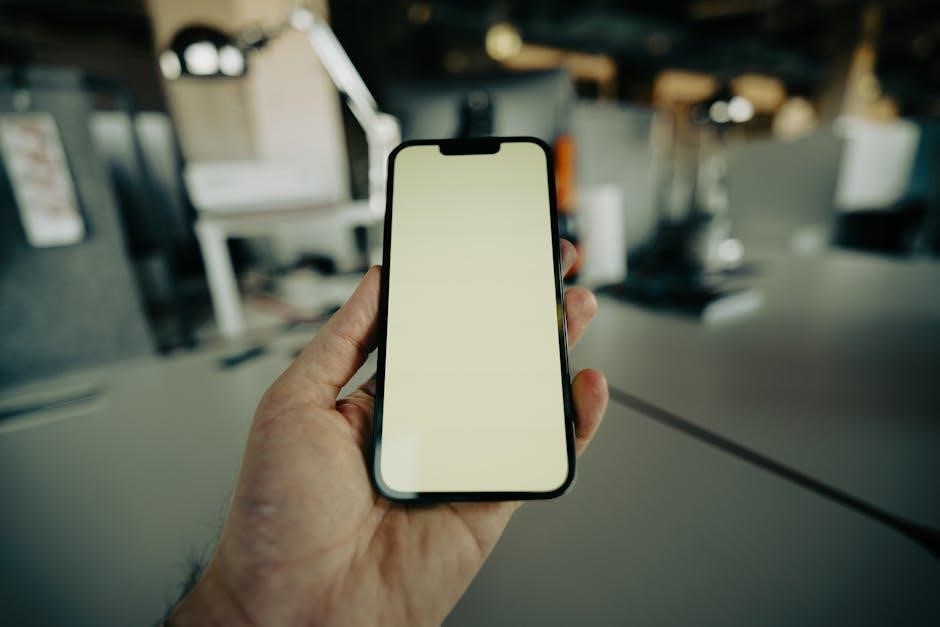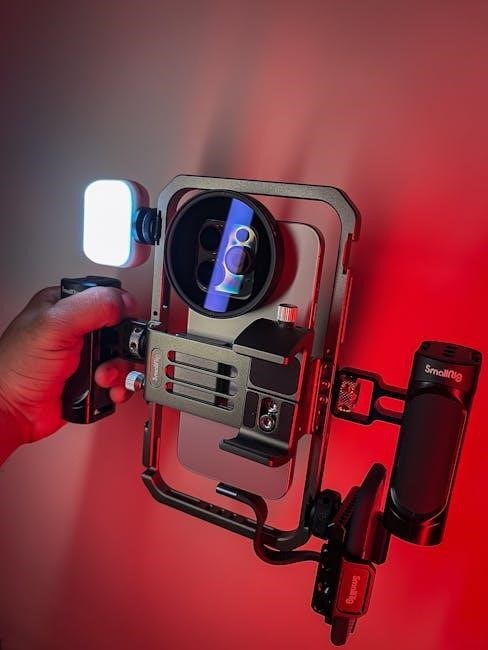
Sarah Ruhl’s Dead Man’s Cell Phone is a quirky comedy exploring themes of technology, love, and identity. The play begins with a ringing phone in a café, sparking Jean’s unexpected journey to uncover the life of the deceased Gordon. This offbeat story delves into modern society’s paradoxes, blending humor with profound reflections on human connection and memory.
Background of the Play
Dead Man’s Cell Phone, written by Sarah Ruhl in 2007, is a quirky comedy that blends humor with deeper reflections on technology, love, and identity. The play premiered in New York and quickly gained attention for its unique exploration of modern society’s relationship with technology. It begins in a café, where Jean, the protagonist, answers a ringing phone left by a deceased stranger, Gordon, setting off a chain of events. Ruhl’s work is known for its offbeat style and ability to balance lighthearted moments with profound themes, making Dead Man’s Cell Phone a standout piece in contemporary theater.
Overview of the Plot
The play begins with Jean, a museum worker, enjoying coffee in a café when a ringing phone at the next table disrupts the peace. Discovering the owner, Gordon, is dead, Jean answers the phone, sparking a journey into his life. She impersonates Gordon, connecting with his family and mistress, uncovering secrets and lies. As Jean navigates this new reality, the phone becomes a lifeline to the past, blending truth and fiction. The story explores themes of identity, memory, and the impact of technology on human relationships, creating a poignant yet humorous reflection on modern life.

Themes Explored in the Play
The play delves into themes of technology’s dual role in uniting and isolating, love and loss, identity, and isolation, reflecting modern life’s complexities through humor and introspection.
The Paradox of Technology
In Dead Man’s Cell Phone, technology serves as both a bridge and a barrier. The cell phone, a symbol of connection, ironically highlights isolation. Jean’s decision to answer Gordon’s phone illustrates how technology can unite strangers yet disrupt genuine human interactions. Ruhl explores how devices, meant to bring people closer, often create emotional distance. The play critiques modern society’s reliance on technology, showing how it complicates relationships and identity, leaving individuals disconnected even as they are constantly connected.
Love, Loss, and Memory
Sarah Ruhl’s Dead Man’s Cell Phone poignantly examines love, loss, and memory through Jean’s journey. The play highlights how love transcends death, as Jean connects with Gordon’s life and loved ones. Her actions reveal the human desire to honor and remember the departed, even strangers. Memory is portrayed as fragile yet enduring, preserved through shared stories and digital traces. The cell phone serves as a vessel for these memories, illustrating how modern technology influences how we grieve and remember, blending the bittersweet nature of loss with the enduring power of love and remembrance.
Identity and Isolation
Dead Man’s Cell Phone delves into themes of identity and isolation, reflecting how technology both connects and alienates individuals. Jean’s journey, sparked by answering Gordon’s phone, highlights her own search for purpose and belonging. The play explores how modern society’s reliance on technology can create emotional distance, even as it bridges physical gaps. Through Jean’s interactions with Gordon’s family and associates, Ruhl illustrates the tension between authentic human connection and the isolating effects of digital communication, ultimately questioning how we define ourselves in a world dominated by technology.

Main Characters and Their Roles
Jean, a museum worker, becomes entangled in Gordon’s life after answering his phone. Gordon, the deceased, leaves behind a legacy of connections and unanswered questions, while other characters reveal their own struggles with identity and isolation.
Jean: The Protagonist
Jean, an empathetic and introverted museum worker, finds herself at the center of the story after answering Gordon’s ringing phone. Her decision to intervene sets off a chain of events that forces her to confront her own identity and sense of purpose. Through her journey, Jean evolves from a bystander to an active participant in the lives of those around her, revealing her deep-seated desire for connection and meaning. Her character serves as a bridge between the living and the dead, exploring themes of empathy and isolation in a technology-driven world.
Gordon: The Deceased
Gordon, the deceased, is a pivotal character whose death sets the story in motion. His unanswered cell phone in a café becomes the catalyst for Jean’s journey. Though Gordon is physically absent, his presence lingers through the phone and the stories Jean uncovers about his life. His character symbolizes the disconnect between modern technology and genuine human connection, as well as the enduring impact one person can have on others. Gordon’s legacy, revealed through his phone, challenges Jean to confront themes of memory, loss, and the complexities of human relationships in a digital age.
Other Characters and Their Significance
Beyond Jean and Gordon, other characters play vital roles in shaping the narrative. Gordon’s family and friends, for instance, embody the emotional ripple effects of his death. Their interactions with Jean reveal the complexities of human relationships and the distances technology can create. These characters also symbolize the broader themes of identity and isolation, as their responses to Gordon’s death reflect their own struggles with connection. Their stories, intertwined with Jean’s journey, highlight the universal longing for understanding and the challenges of bridging the gap between the digital and the human experience;

Symbolism in the Play
The café symbolizes a public yet isolating space, while the cell phone represents both connection and disconnection, reflecting modern society’s paradox of constant yet unfulfilling communication.
The Cell Phone as a Symbol
The cell phone in Sarah Ruhl’s play serves as a powerful symbol, bridging life and death while highlighting modern society’s obsession with technology. It represents both connection and isolation, as Jean uses it to communicate with Gordon’s past, yet its constant ringing disrupts the café’s peace. The phone embodies the paradox of technology—offering a voice to the deceased but also alienating the living. Through its persistent notifications, the phone mirrors society’s fixation on digital communication, emphasizing how it can both unite and divide. This duality underscores the play’s exploration of human connection in the digital age.
The Café as a Setting
The café in Dead Man’s Cell Phone is more than a backdrop; it’s a symbolic space where the ordinary and extraordinary intersect. This intimate setting, with its quiet atmosphere, contrasts sharply with the disruption caused by the ringing phone, symbolizing how technology intrudes into private moments. The café becomes a place of unexpected connection, where Jean’s life intertwines with Gordon’s legacy. Its simplicity allows the audience to focus on the emotional journey, while its neutrality underscores the universality of the themes. The café serves as a microcosm of modern life, where isolation and connection coexist.

Production History
Dead Man’s Cell Phone premiered in 2007, gaining acclaim in New York and beyond. Notable stagings include productions in Long Beach, Las Vegas, and Tampa, solidifying its popularity.
Original Production and Reception
The original production of Dead Man’s Cell Phone debuted in 2007, quickly becoming a sensation in New York theater circles. Critics praised its unique blend of humor and philosophical depth, with many noting its fresh perspective on modern life. The play’s exploration of technology’s dual role in connecting and isolating individuals resonated with audiences, making it one of the most talked-about productions of the season. Its success led to widespread recognition for Sarah Ruhl, solidifying her reputation as a bold and innovative playwright.
Notable Stagings and Adaptations
Dead Man’s Cell Phone has been staged in various productions across the U.S. and internationally. Notable performances include the International City Theatre in Long Beach, where it showcased Ruhl’s signature blend of humor and introspection. The play was also adapted into a PDF format, making it accessible for digital audiences. Its unique themes and dialogue have allowed for creative interpretations, with productions in Las Vegas, Tampa, and even Ireland, such as the Dalkey Players’ entry in the RTE All-Ireland Drama Festival. These stagings highlight the play’s universal appeal and adaptability to different audiences and formats.

Key Scenes and Dialogue
The play’s pivotal moment occurs when Jean, annoyed by a ringing phone, discovers Gordon’s lifeless body and decides to answer, sparking a chain of unexpected events.
The Ringing Phone and Its Impact
The incessantly ringing phone in the café serves as a catalyst for the story. Jean, seeking solitude, is interrupted by the phone’s persistent ring. Upon discovering Gordon’s lifeless body, she decides to answer, an act that propels her into a journey of uncovering his life. This moment symbolizes how technology intrudes into personal spaces, yet also connects strangers in unexpected ways. The phone’s ring disrupts the café’s tranquility, setting off a chain reaction that intertwines Jean’s life with Gordon’s legacy, exploring themes of isolation and human connection in the digital age.
Jean’s Decision to Answer the Phone
Jean’s decision to answer Gordon’s ringing phone marks a pivotal moment, driven by a mix of irritation and empathy. By answering, she unknowingly steps into Gordon’s life, becoming an unlikely mediator between the dead man and his loved ones. This act transforms Jean from a passive bystander to an active participant, setting her on a journey of discovery. Her choice to engage with the unknown reflects the human impulse to connect, even in the face of death, and underscores the phone’s role as a bridge between the living and the departed.

Sarah Ruhl’s Writing Style
Sarah Ruhl’s writing in “Dead Man’s Cell Phone” combines lyrical dialogue with absurd humor, exploring emotional paradoxes and the isolating effects of technology poignantly.
Use of Language and Dialogue
Ruhl’s dialogue in Dead Man’s Cell Phone is both poetic and absurd, blending humor with emotional depth. Her language captures the isolation of modern life, where technology connects yet alienates. Through Jean’s interactions, Ruhl explores themes of identity and memory, using dialogue to reveal character complexities. The play’s script is rich with metaphors, creating a unique atmosphere that balances the surreal with the relatable. Ruhl’s writing style emphasizes silence and pauses, allowing actors to convey unspoken emotions, making the dialogue a powerful tool for storytelling and emotional resonance.
Exploration of Human Emotions
Dead Man’s Cell Phone masterfully explores human emotions through Jean’s journey, blending grief, guilt, and unexpected connections. Ruhl captures the complexity of empathy, as Jean navigates the aftermath of Gordon’s death, uncovering his life and loved ones. The play delves into loneliness, love, and the search for meaning, juxtaposing humor with poignant moments. Jean’s emotional transformation reflects the audience’s own experiences, highlighting the universal struggle to balance isolation and connection in a technological age. Ruhl’s nuanced portrayal of emotions creates a deeply relatable and resonant narrative, inviting reflection on modern life’s challenges and vulnerabilities.

Performances and Acting
The play’s success hinges on powerful performances, with actors bringing depth to complex characters like Jean and Gordon. Their portrayals vividly capture the emotional essence of Ruhl’s script, blending humor and pathos seamlessly.
Acting Techniques in the Play
Actors in Dead Man’s Cell Phone employ dynamic techniques to portray complex emotions and absurd situations. Jean’s transformation from bystander to guardian of Gordon’s legacy requires nuanced expressions, balancing humor and poignancy. The cast uses physicality and voice modulation to convey the play’s quirky tone, while subtle facial expressions highlight the characters’ inner struggles. Ruhl’s dialogue, rich in metaphor, demands precise timing and delivery to capture the emotional depth. These techniques collectively create a captivating experience, blending the surreal with the deeply human, and emphasizing the play’s exploration of isolation and connection in a technology-driven world.
Director’s Interpretation
Directors often emphasize the surreal and emotional layers of Dead Man’s Cell Phone, focusing on Jean’s transformative journey. The minimalist set design, particularly the café setting, is used to highlight isolation and connection. Lighting and sound effects, such as the persistent ringtone, create a haunting atmosphere. Directors may interpret Jean’s actions as a metaphor for modern society’s reliance on technology to navigate grief and identity. The play’s quirky humor is balanced with poignant moments, allowing audiences to reflect on the intersection of humanity and technology. This interpretation underscores Ruhl’s exploration of love, loss, and memory in a digital world.

Critical Reception
Critics have praised Dead Man’s Cell Phone for its unique blend of humor and emotional depth, though some find its eccentricity polarizing. The play’s exploration of technology’s impact resonates deeply, earning it acclaim for its thought-provoking themes and innovative storytelling.
Positive Reviews and Acclaim
Dead Man’s Cell Phone has garnered critical acclaim for its unique blend of humor and emotional depth; Critics praise its exploration of technology’s paradoxical role in modern life, highlighting how it unites and isolates us. The play’s quirky yet poignant storytelling has resonated with audiences, earning it recognition for its originality and thought-provoking themes. Sarah Ruhl’s ability to weave absurdity with heartfelt moments has been particularly lauded, making the play a standout in contemporary theater. Its nuanced portrayal of human emotions and societal critiques has solidified its place as a compelling and memorable production.
Mixed Reactions and Controversies
While Dead Man’s Cell Phone has been praised for its originality, it has also sparked mixed reactions. Some critics find its absurdity and unconventional style captivating, while others argue it lacks coherence. The play’s exploration of technology’s role in society has been both lauded and criticized for being overly simplistic. Audiences are divided on its pacing and resolution, with some appreciating its emotional depth and others finding it disjointed. Despite the controversy, the play’s ability to provoke thought and stir debate underscores its impact as a contemporary theatrical work challenging traditional storytelling norms.

Contemporary Relevance
Dead Man’s Cell Phone resonates with modern society’s obsession with technology and its paradoxical ability to unite and isolate. The play’s themes of digital remembrance and human connection remain timely, reflecting our evolving relationship with death and memory in the digital age.
Technology and Society Today
Dead Man’s Cell Phone critiques modern society’s obsession with technology, highlighting its dual role in uniting and isolating individuals. The play explores how cell phones, as constant companions, blur the lines between public and private spaces, creating both connection and disconnection. Jean’s journey reflects the tension between the digital world and human intimacy, echoing contemporary concerns about the impact of technology on relationships and identity. The play’s themes resonate with today’s society, where technology often serves as both a lifeline and a barrier, shaping how we navigate love, loss, and remembrance in the digital age.
Death and Remembrance in the Digital Age
Dead Man’s Cell Phone examines how technology reshapes our understanding of death and remembrance. The play highlights the cell phone as a bridge between the living and the dead, allowing voices from beyond the grave to linger. Jean’s journey illustrates the paradox of technology preserving memories while fostering isolation. The digital age complicates grief, as loved ones grapple with the enduring presence of the deceased through devices. Ruhl’s exploration of this theme challenges audiences to reflect on how they navigate loss in a world where connections persist even after death, blending the sacred and the mundane.
Sarah Ruhl’s Dead Man’s Cell Phone poignantly explores the interplay of technology and human connection, leaving a lasting commentary on love, loss, and identity in the digital age.
Final Thoughts on the Play
Dead Man’s Cell Phone is a thought-provoking exploration of modern life, blending humor with philosophical depth. Sarah Ruhl’s unique voice examines how technology both unites and isolates us, offering a poignant reflection on love, loss, and identity. The play’s quirky narrative, centered around Jean’s unexpected journey, resonates with audiences, prompting them to consider their own relationships with technology and memory. Its innovative storytelling and emotional resonance make it a memorable commentary on contemporary society and human connection in the digital age.
Impact and Legacy of “Dead Man’s Cell Phone”
Sarah Ruhl’s Dead Man’s Cell Phone has left a lasting impact on contemporary theater, praised for its unique blend of humor and philosophical depth. The play’s exploration of technology’s role in modern life resonated widely, making it a significant work in today’s digital culture. Its success led to numerous productions across the U.S. and internationally, solidifying Ruhl’s reputation as a bold and innovative playwright. The play’s themes of love, loss, and identity continue to inspire audiences, ensuring its legacy as a thought-provoking commentary on human connection in the digital age.
Leave a Reply
You must be logged in to post a comment.